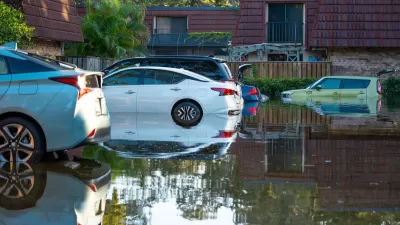A class-action lawsuit filed by Farmers Insurance Co. against the city of Chicago raises questions on municipal responsibility to prepare against 'foreseeable risk.'
Gail Sullivan of the Washington Post details the events that led up to the suit. Between April 2013's state of emergency declared by Governor Pat Quinn after an 'epic deluge', insurance companies, led by Farmers, investigated and found Chicago-area municipalities negligently operated and managed drainage systems inadequate to prevent flooding of insured properties.
The plaintiffs allege "'During the past 40 years, climate change in Cook County has caused rains to be of greater volume, greater intensity and greater duration than pre-1970 rainfall history evidenced'... [cites] a climate change action plan adopted in 2008 that acknowledges the link between climate change and increased rainfall."
Reports one insurance analyst in the article: "I think what the insurers are saying is: 'We’re in the business of covering unforeseen risks. Things that are basically accidents,'" Ceres insurance industry analyst Andrew Logan told NPR. "'But we’re now at a point with the science where climate change is now a foreseeable risk.'"
FULL STORY: Climate change: Get ready or get sued

Planetizen Federal Action Tracker
A weekly monitor of how Trump’s orders and actions are impacting planners and planning in America.

Restaurant Patios Were a Pandemic Win — Why Were They so Hard to Keep?
Social distancing requirements and changes in travel patterns prompted cities to pilot new uses for street and sidewalk space. Then it got complicated.

Maui's Vacation Rental Debate Turns Ugly
Verbal attacks, misinformation campaigns and fistfights plague a high-stakes debate to convert thousands of vacation rentals into long-term housing.

In California Battle of Housing vs. Environment, Housing Just Won
A new state law significantly limits the power of CEQA, an environmental review law that served as a powerful tool for blocking new development.

Boulder Eliminates Parking Minimums Citywide
Officials estimate the cost of building a single underground parking space at up to $100,000.

Orange County, Florida Adopts Largest US “Sprawl Repair” Code
The ‘Orange Code’ seeks to rectify decades of sprawl-inducing, car-oriented development.
Urban Design for Planners 1: Software Tools
This six-course series explores essential urban design concepts using open source software and equips planners with the tools they need to participate fully in the urban design process.
Planning for Universal Design
Learn the tools for implementing Universal Design in planning regulations.
Heyer Gruel & Associates PA
JM Goldson LLC
Custer County Colorado
City of Camden Redevelopment Agency
City of Astoria
Transportation Research & Education Center (TREC) at Portland State University
Jefferson Parish Government
Camden Redevelopment Agency
City of Claremont




























